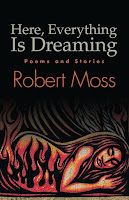I return again and again to the works of Jorge Luis Borges, my favorite essayist and short story writer and one of my favorite poets. I share his fascination with the theme of the double. Like Borges, I am intrigued by the possibility that we can encounter our past, future and parallel selves. For me, based on my social life in dreaming, this is a certainty. I and once published a story ("The Other Again") which borrows the structure of Borges" story "The Other", just as he borrowed the ideas and form of a story by Kurd Lasswitz ( which he reviewed in an essay titled "The Total Library") in order to to craft his celebrated "Library of Babel".*
Borges attributed his fascination with the double to his love of R.L.Stevenson. In one Borges story (“Borges and I”), he feels empty and abandoned, while watching a second self write his stories and claim his fame. In another (“August 25, 1983”), as a man already 70, he walks from a station to a hotel at night to find he has already checked in, to room 19, a number with great significance. The clerk recognizes him with difficulty.
He goes up to the
room and finds his older self, now blind and 84, staring up at the ceiling,
with an empty bottle nearby. His older self tells him he has come here to die –
he says to commit suicide – and tells Borges things he will do before he
arrives at the same situation. When Borges denies that this is what his future
holds, his older self insists that things will proceed as he says, but that
when the younger Borges reaches this point, he will remember the encounter, if
at all, only as a faded dream.
In stories like this, Borges is dreaming on paper. He gives us his opinions about dreams in an essay misleadingly titles "Nightmares" (since nightmares are not the main content). Here he teases us with the thought that life itself is a dream, La vida es sueño:
"For the savage and for the child, dreams are episodes of the waking life; for poets and mystics, it is not impossible for all of the waking life to be a dream. This was said, in a dry and laconic fashion, by Calderón: 'Life is a dream.' It was said, with an image, by Shakespeare: 'We are such stuff as dreams are made on.' And splendidly by the Austrian poet Walter von der Vogelweide, who asked, 'Ist mein Leben geträumt oder ist es wahr?' – have I dreamed my life or is it real?"
Yet as far as I am aware we don't have Borges' dream journal, perhaps because he did not keep one. I read Edwin Williamson’s long biography of Borges and found that the dreams are mostly missing. There’s mention of an early and recurring nightmare, in which Borges does not know where he is or who he is, a dream that may have anticipated his blindness but extends to his existential condition. There are a couple of references to nightmares in his later years – of being terrified by a dream that oppressed him in a book-lined basement in a professor’s house in East Lansing, so he had to be moved to a hotel; of a terrible dream in which he is crucified and glimpses a she-wolf as his oppressor. But nothing, really, about the dreams that may have inspired and fueled the poems and stories.
Did Borges really dream only on paper? If so,
this might account for his uncertainty about whether there is an afterlife,
something that weighed on him into his final days. His father – who went blind
long before him – sometimes spoke of his longing for death in the sense of
being totally “extinguished”. Borges, bitterly and recurringly rejected by
women and disappointed in love, and tied to the clumsy body of a failing,
eventually sightless animal, also yearned for this, and often thought of
suicide. Feeling close to his own death, three years after the death of his
boyhood friend from
I cannot tell whether you are still someone
I cannot tell whether you can hear me [2]
Yet the next year in a Greek taverna in
Borges was now
released to imagine – in a burst of visionary optimism after all the black
despair – a world created by dreamers. In his prose poem “Someone Shall Dream”
(“Alguien sonará”) the future “shall dream dreams more vivid than our waking
life today. It shall dream that we can work miracles, and that we won’t carry
them out because it will be more real to imagine them. It shall dream worlds so
intense that the voice of a single bird could kill us.”
1. Jorge Luis Borges, "Nightmares" in Seven Nights trans. Eliot Weinberger (New York: New Directions, 2009)
2. "Elegy" quoted in Edwin Williamson, Borges: A Life (New York: Viking 2004) p.468
3.“Abramowicz” in Los Conjurados. Quoted in Williamson p. 470
My story "The Other Again" is published in Here, Everything is Dreaming: Poems and Stories by Robert Moss (Excelsior Editions).
"Borges Twinned": Digital play by RM



No comments:
Post a Comment